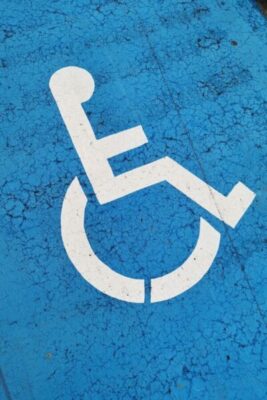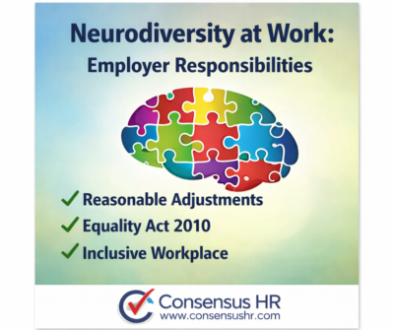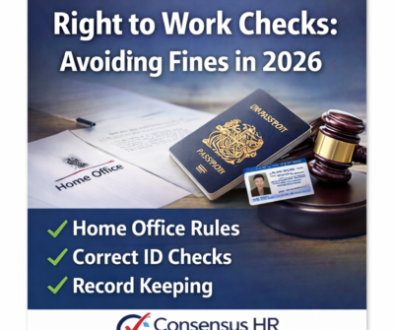Reasonable Adjustments re Disability Discrimination | Consensus HR
Our Latest blog: Disability Discrimination: Reasonable Adjustments.
The Equality Act 2010 says that employers must make reasonable adjustments for:
- employees and workers,
- contractors and self-employed people hired to personally do the work, and
- job applicants.
A ‘reasonable adjustment’ is a change to remove or reduce any disadvantage associated with a person’s disability. For employers, this is important when people apply for or perform a role. Action could involve changing an existing employee’s working conditions or environment. When recruiting, at all stages of the recruitment process must not discriminate against disabled applicants.
What does this mean to employers?
It is essential that employers consider any reasonable adjustments to procedures, physical features and aids or services to support disabled employees. Changes could be identified by asking individuals:
- Do they need a parking space near the door?
- Do they need to be near toilets?
- Do they need a different desk or chair?
Employers can also:
- Alter an employee’s hours of work.
- Do things another way – e.g. allowing someone with social anxiety disorder to have their own desk instead of hot-desking.
- Make physical changes – e.g. installing a ramp for a wheelchair user or an audio-visual fire alarm for a deaf person.
- Let a disabled person work somewhere else – e.g. on the ground floor for a wheelchair user.
- Change their equipment – e.g. providing a special keyboard if they have arthritis.
- Allow employees who become disabled to make a phased return to work – e.g. working flexible hours or part-time.
- Offer employees training opportunities, recreation and refreshment facilities.
Not making reasonable adjustments becomes unlawful discrimination according to the Equality Act 2010. Necessary changes can be requested. If the person or organisation refuses, an individual can make a discrimination claim under the Act.



Asking the question…
It is essential that every employer complies with employment law requirements.
Under the Equality Act 2010, employers must not ask applicants questions about health or disability before making a job offer, except for certain permitted reasons, (details available upon request).
The Act does allow questions to be asked for the purpose of establishing if any reasonable adjustments should be made during the recruitment process. For example: when inviting an applicant for an interview they should be asked, (either by telephone or in writing), if any reasonable adjustments are needed to enable them to attend.
Our Comment:
Matthew from Consensus HR explains: “Able-bodied people can sometimes forget what they do on a day-to-day basis may vary differently or simply not be possible for somebody with a disability. Examples include walking up and down stairs, standing for long times or how frequently they need to visit the toilet.”
Employers must not make assumptions that no reasonable adjustments are needed. It is up to the employer to find out from the applicant during the recruitment process so that they can offer reasonable adjustments as required. Some applicants prefer not to disclose a disability. In these cases, the employer cannot be expected to make adjustments until it becomes apparent in the workplace or the applicant decides to inform the company.
Employers should always aim to build a trusting relationship with their teams and demonstrate that regardless of a person’s sex, age, colour, or disability (to name a few). All individuals are valued. By building this trust and confidence, the employee will feel able to discuss these core areas should the need occur.
Are you an employer?
What does the Equality Act 2010 mean for you in practical terms?
Talk to Matthew at Consensus HR for practical expert advice without obligation or HR jargon.




